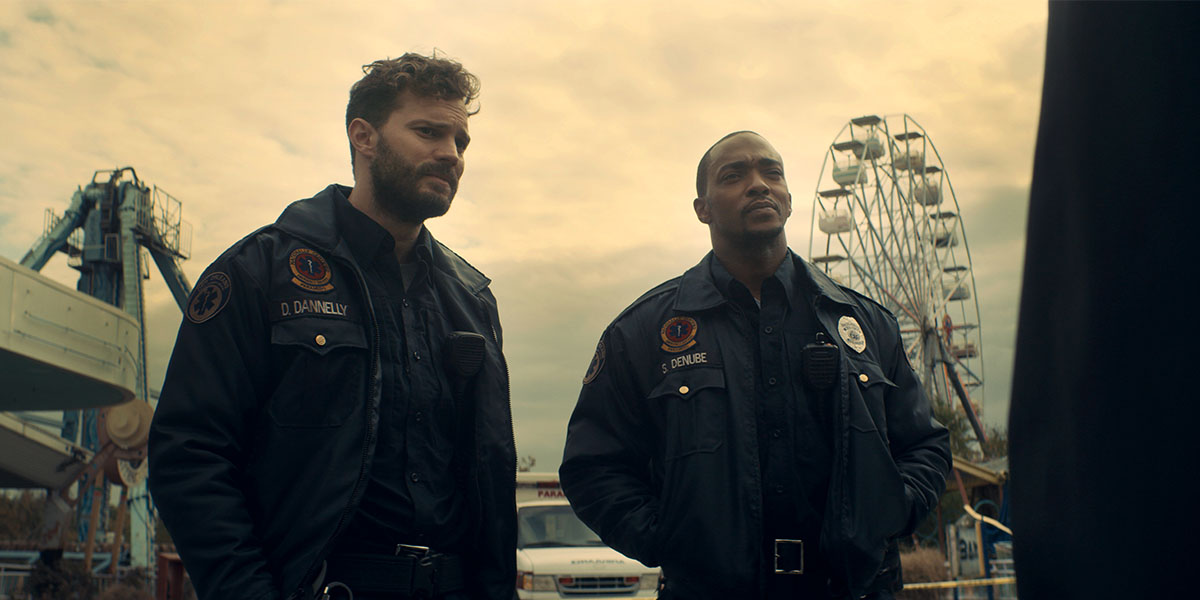When two paramedic best friends in New Orleans discovered the first unexplainable injury on their route, they didn’t really think much about it. The second? Well, it was a body. They shouldn’t have even been called. What about the third, though? A snake bite in a hotel room without a snake alongside a disappeared boyfriend? That’s when you start looking for the connective tissue holding everything together besides Steve (Anthony Mackie) and Dennis (Jamie Dornan) having the bad luck to catch them all. That’s when the label of a designer drug comes into focus. The name? Synchronic. Rather than a reference to “meaningful coincidences” (since coincidence was ruled out), directors Justin Benson and Aaron Moorhead lean towards Carl Jung’s “togetherness” definition. They’ve simply defined the cause along with the meaning.
Similar to their other films, this science fiction conceit arrives as an aberration to an otherwise familiar world. Rather than a person (Spring) or place (The Endless), the anachronism is time itself. This drug more or less opens the user’s mind to the theory that all time—past, present, and future—exists simultaneously for perpetuity. The veil is lifted to give their “high” shape in the form of their exact location at another point in history. Is it hallucination? The victims remaining at these crime scenes would hypothesize a yes. How do you explain the evidence of violence, though? How does someone seeing a snake while under the influence manifest a bite? It’s one question after another revolving around an impossibility and Steve and Dennis have been caught in its web.
If you’ve ever seen a Benson and Moorhead film, however, you’ll know this intrigue is nothing more than world-building. It’s a hook that gives characters purpose in motion while the human element at its back comes into focus. That piece is again steeped in love: familial and platonic. How does its weight impact our actions and how far are we willing to go to save it? For Steve, it’s the difficulty of accepting a nightmare diagnosis and telling the one constant in his life. For Dennis, it’s getting out of his own way for his wife (Katie Aselton’s Tara), teenage daughter (Ally Ioannides’ Brianna), and newborn—age crushing his spirit. They deflect, distract, and hide behind escapist vices, hoping to endure until it becomes an imperative to fight.
It’s tough to know when you’re saying too much with a film like this. Some will probably say I already have. So I’ll leave things at the vague notion that someone will need to be saved and the drug proves the sole means of doing so. We therefore spend half the movie learning about its power via strangers on Steve and Dennis’ route while the two of them come into clearer focus. The second half is then the process of learning how to wield it to their advantage and how time travel in New Orleans will always be problematic for a black man. Steve will be risking his life twice with every use: when he takes the pill and when he determines whatever version of racism he’s about to confront.
That doesn’t mean he doesn’t also face it in the present, though. Assumptions abound throughout the duration from Steve dealing with idiot cops on his beat to Dennis thinking the worst about his buddy’s morphine use when asking what’s really going on could have explained it away. But this is what happens in high pressure, emotionally volatile situations. We let our judgment cloud in order to project our self-loathing as blame upon anyone nearby. Tara does it to Dennis and he does it to Brianna. Things are changing rapidly and nobody knows how to cope until the worst-case scenario forces their hand to rediscover who it is they truly are beneath the rumors, gripes, and fantasies. Tempers will flare, but love never wavers. We sometimes just need a reminder.
Mackie is the heart and soul of Synchronic even before the film shifts to him alone. He’s always the one with problems he cannot completely share—who listens to Dennis complain about things that seem so insignificant by comparison. He’s the one who takes us on this adventure that proves a lot darker than you might expect with conquistadors, voodoo, the KKK, and Confederate soldiers all crossing his path with guns blazing. While the scientific experiments he conducts in his apartment are as sound as they are entertaining (Steve is fond of physics), it does come off as conveniently assured. A lot of the narrative does, actually, as moments that will come back into play later land with thuds despite the filmmakers’ previous two works excelling in subtlety.
Much of this is due to a very quick pace. Benson and Moorhead removed all excess—great for propulsion, but a detriment to investment. Actions become almost robotic at times as their inclusion is more about advancement than character building. This is a shame since who these men are is the point and losing even a little of that along the way risks the end hitting with more melodrama than power. Where I could forget the details of the genre element in Spring and The Endless to really latch onto the people therein, the opposite proves true here. What linger are the wild set pieces and sci-fi theories. Steve and Dennis kind of become the operators who give that form. While that’s still objectively enough, I was left wanting more.
Synchronic premiered at the Toronto International Film Festival.

